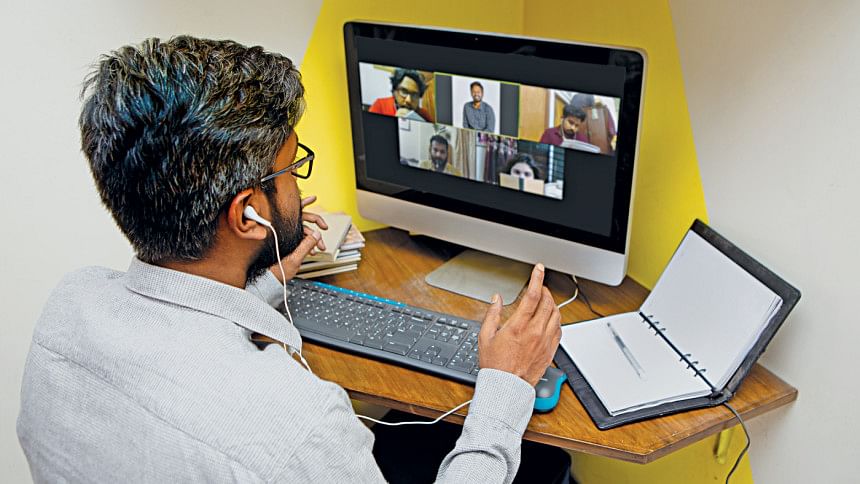ONLINE CLASSES: Are they doing it right?

Almost a month into the coronavirus pandemic and academic institutions are yet to find a consistent way to deal with the situation. While some universities have decided to suspend academic activities altogether, others have taken a more tech-based approach by conducting classes online through platforms like Google Meet, Zoom or Discord. However, the opinion regarding such measures is very scattered.
After talking to students from multiple institutions, it's clear that many are against the idea. Their main argument against online classes is also one of the biggest problems that most developing countries face — lack of a stable internet connection. Even if they are able to attend the classes, the experience is highly inefficient because they have difficulties following the lecture as the network breaks down every now and then and they are not able to properly communicate with the teachers. This problem gets worse when it comes to students who have gone to visit their families in rural areas. While the whole purpose of education is to close the class division and increasing accessibility, online classes may end up furthering that gap.
Due to the nature of this article and what students had to say, the names have been changed to protect the students' identities, and marked with asterisks.
Urmila Das*, a third-year Architecture student at Brac University (BRACU) says, "While we had online classes the first few days, our university understood that it is not really feasible and accessible to many students and since the purpose of these classes is for all of us to learn, we do not have online classes anymore and I think this is something that other institutions should do as well."
Students have also argued that conducting online classes discourages class participation because doing class work becomes a privilege that only people who have laptops or computers can afford. In the current situation, people are neither able to access cyber cafes or are able to get their computers fixed if there is a malfunction. Not to mention that a lot of the students might not even own personal computers. A lot of them also argue that they shouldn't have to worry about such things given these are facilities that they paid for when they paid their tuition fees.
Alvi Ananya*, a final-year Marketing student at BRACU says, "I do not think that the quality of online classes are the same as in-person classes. They are less engaging than normal classes. Moreover, given the fact that we are not using a lot of the services that we paid for like electricity, students deserve partial refund on their tuition fees."
The topic that probably generates the most amount of outrage among students is conducting online exams, quizzes, presentations or any sort of graded activity through online platforms.
Anika Ahmed*, a third-year Marketing student at North South University (NSU) says, "I sat for a midterm last week. Our faculty gave us exactly an hour to turn in our scripts via Google Classroom. I constantly kept thinking what if my internet stops working? What if there is no electricity? And I am one of the more privileged ones who have access to Wi-Fi and a laptop. I am also very confused as to what will happen to my grades this semester. One day we see that there is a notice regarding the cancellation of all online exams and the next day we find another email asking us to sit for a quiz or presentation."
Some students, especially from the engineering background, have concerns regarding the way in which they are being taught in the online classes.
Priyom Khan*, a third-year Computer Science and Engineering student from NSU says that he has difficulty understanding equations and doing math via online classes given that not all the teachers have whiteboards and thus understanding the topics can be difficult.
Finally, a lot of students also have concerns regarding the mental pressure such classes and exams are putting on the students during the time of a global pandemic. When asked about how he is coping with classes in these troubling times, Rawnak Khan*, a second-year student of Institution of Business Administration, University of Dhaka, says, "It is very difficult to focus on classes and make slides for presentations when people are dying every day. I find it to be mentally pressurising and unnecessary to have classes and presentations at this time."
However, it is not all that bad. Many students also show support for online classes but with some added changes. Tabassum Rahman*, a third-year student from of Management from NSU says that online classes should most definitely continue because she does not want her semester to be extended for a long time but she argues that the classes should always be recorded and teachers should avoid taking exams.
Faculty members, on the other hand, find the idea of online classes to be one that is a step in the positive direction. When asked about this, Omar Nasif Abdullah, Lecturer and Assistant Proctor at NSU said, "While there are bad aspects of online classes, the good aspect of online connectivity is that it doesn't require much logistics. It has the effect where concerned parties can communicate right away, provided they have means to do so — a smartphone with functioning internet. It has been proven great at a time when physical distancing is must. Online classes have a 'democratic' aspect where students who otherwise wouldn't participate in a conversation because of their introverted nature are willing to chip in because the anxiety associated with embarrassments is much less in an online environment."
Many institutions like Bangladesh University of Professionals (BUP) have responded to some of the concerns in creative ways. Yasin Shafi, Lecturer at BUP, told us that the university has been helping students by buying mobile internet packages for them so they do not have to go outside.
In practical terms, online classes may actually become a regular thing given how the situation has been unfolding. It's important to get it right, and make sure no group of students are being left behind in the process.
Megha Rahman has considered giving up on education. Let her know your thoughts at [email protected]

 For all latest news, follow The Daily Star's Google News channel.
For all latest news, follow The Daily Star's Google News channel. 








Comments